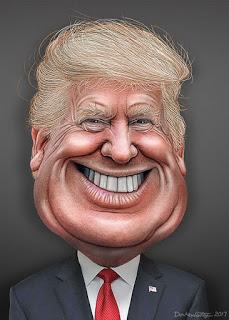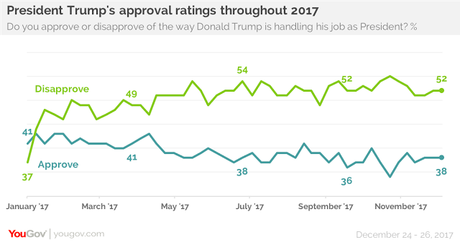 (This caricature of Donald Trump is by DonkeyHotey.)
(This caricature of Donald Trump is by DonkeyHotey.)I have heard many media pundits claim that the Democrats need to have a clearer agenda for the 2018 midterm elections -- that their opposition to Donald Trump and his odious agenda is not enough. I disagree.
Midterm elections are traditionally a reaction from the public on the sitting president, and 2018 will be no different. In fact, it may be even more so in 2018, because Trump's approval numbers are so abysmal (and have remained so for many months now).
All the Democrats really need to do is assure the voting public that they will rein in Donald Trump and his hurtful agenda.
Here's part of how Ronald Brownstein describes it at CNN.com:
As the 2018 election year begins, one question above all is likely to shape its outcome: Will Americans vote to constrain President Donald Trump by electing a Democrat-led Congress that will challenge and resist him, or to empower the Republicans who are increasingly working in harness with him? Voters have increasingly viewed House and Senate elections less as a choice between individual candidates than a referendum on which party they want to control Congress -- a choice grounded in their assessments of the President. All evidence from the special elections in 2017 suggests that pattern will continue to drive voters' decisions this year. As more voters have treated congressional elections in effect as parliamentary choices, it's grown difficult for either side to maintain the unified control of the House, the Senate and the White House that Republicans enjoy now. The last three times one party went into a midterm election holding unified control, in fact, voters have revoked it -- providing the opposition party control of one or both congressional chambers. That was the fate of Democrats under Barack Obama in 2010, Republicans under George W. Bush in 2006 and Democrats under Bill Clinton in 1994. The ominous precedent for Republicans is that Trump's standing with the public now is weaker than each of those predecessors' was when their party lost unified control during midterm elections. (Trump's recent tweets suggesting his approval rating is as strong as Obama's are not borne out by the facts.) Depending on the survey, the share of Americans expressing approval of Trump's performance generally runs from about 35% to 40%, while the share disapproving runs from around 55% to 60%. That means he faces a "disapproval gap" of around 15 to 20 points in most surveys. That puts Trump at the higher end of the deficits that confronted the last three presidents who lost unified control of government. Polling by the nonpartisan Pew Research Center put Obama's net approval rating at about even in October 2010, Clinton's at minus-six points in October 1994 and Bush, the closest parallel to Trump, at minus-16 in October 2006. In the elections a few weeks later, each of those president's parties suffered sweeping losses. Attitudes toward the sitting president seeded each of these whirlwinds. In 1994, according to the Election Day exit polls, 83% of the voters who disapproved of Clinton voted Republican in House elections. In 2006, 82% of those who disapproved of Bush voted Democratic. In 2010, 84% of Obama disapprovers voted Republican.
The chart below is from YouGov Polling:


